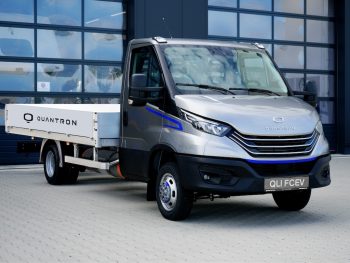A new multi-million pound project tasked with delivering a hydrogen transport hub has gone live in the Tees Valley to decarbonise deliveries.

The programme, funded a £7m injection from the Department for Transport and supported by private investment, will deliver a publicly accessible green hydrogen refuelling station. This will be located near Middlesbrough and built by fuel distributer Exolum.
It will also showcase the first large-scale deployment of fuel cell electric commercial vehicles and HGVs in the UK as part of the Tees Valley Hydrogen Vehicle Ecosystem (HYVE) Consortium.
As the selected HGV leasing partner within the consortium, Novuna Vehicle Solutions will work alongside German manufacturer Quantron AG to build, fund and manage the in-life maintenance of more than 20 fuel cell electric HGVs ranging from 4.2 to 27 tonnes deployed in the project.
These will be used by some of the region’s largest vehicle operators within the logistics, infrastructure, utilities and home delivery sectors, replacing existing diesel vehicles.
Data monitoring and performance evaluation will be provided by the School of Computer Engineering and Digital Technologies at Teesside University, who have extensive experience in the fuel cell field.
Jon Lawes, managing director of Novuna Vehicle Solutions, said: “This project is crucial to removing barriers and addressing the needs of operators at every stage of the ecosystem, in turn realising the commercial viability of hydrogen, at scale, and transforming the heavy transport sector which has been left behind in the road to net zero fleets.
“With our experience and unique capability to build, fund and manage the in-life maintenance across all vehicle types, including HGVs, we’re looking forward to collaborating with other selected participants to create a cleaner transport sector and ultimately unlock the vast potential of fuel cell hydrogen vehicles.
“Being firmly at the forefront in addressing the challenges of decarbonising heavy-duty vehicles complements our broader zero emissions strategy which is already comprehensively supporting fleets transition to Electric Vehicles.”
Novuna is also currently in discussion to support separate trials of hydrogen vehicles for Network Rail.
Tees Valley Combined Authority will also use £300,000 of government funding to run a competition for Tees Valley colleges and training institutions to purchase hydrogen training equipment to upskill the local workforce.
Today’s funding follows the announcement of the first two winning projects, led by ULEMCo and Element 2, which will develop hydrogen-powered airport ground-based support vehicles and create new hydrogen refuelling stations.
Technology and Decarbonisation Minister Anthony Browne said: “It’s fantastic to see the Tees Valley continue to be a trailblazer in this vital technology to decarbonise heavier vehicles – leading the way for the wider rollout of green hydrogen.
“These three winning projects will not only support jobs and economic growth in the Tees Valley but will also help decarbonise our transport network.”

